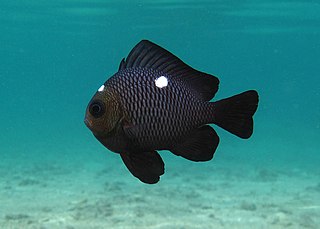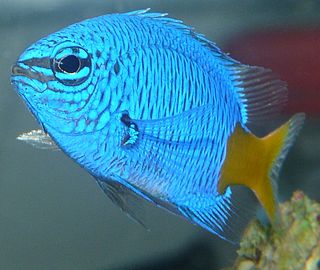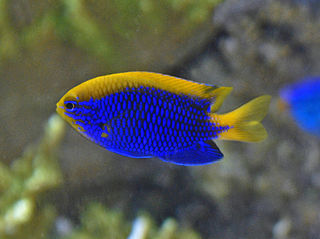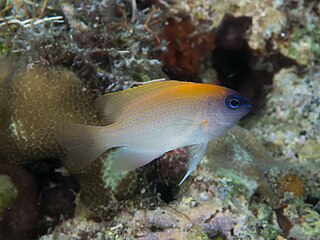
Pomacentrus is a genus of marine damselfish in the family Pomacentridae. These fish inhabit tropical locations and are often captured or bred as aquarium fish.

Chrysiptera is a genus of damselfish in the family Pomacentridae.

The threespot dascyllus, also known as the domino damsel or simply domino, is a species of damselfish from the family Pomacentridae. It is native to the Indo-Pacific from the Red Sea and East Africa, to the Pitcairn Islands, southern Japan, and Australia, and can also be found in some parts of the Philippines. Its grey to black body has two lateral white spots and one between the eyes like domino hence the name; the threespot dascyllus grows up to 13 cm in length. Coloration is somewhat variable; the spot on the forehead may be absent and the lateral spots very much reduced. It feeds on algae, copepods and other planktonic crustaceans.

Chrysiptera cyanea is a species of damselfish found in the wide Indo-West Pacific but not known in the Red Sea. A few individuals were observed in the Mediterranean Sea in 2013 off Slovenia, a likely aquarium release.

Chrysiptera parasema, also known as yellowtail damselfish, yellowtail blue damsel, goldtail demoiselle and other variations, is a saltwater species of fish from the Indo-Pacific. It was described by Henry Weed Fowler in 1918.

Chrysiptera talboti, known commonly as Talbot's damselfish and Talbot's demoiselle, is a species of damselfish. It is a marine fish from the eastern Indian Ocean and western Pacific.

Chrysiptera hemicyanea, known commonly as the azure damselfish, azure demoiselle, half-blue demoiselle, and yellow-dipped damsel, is a species of damselfish.

Chromis chromis, the damselfish or Mediterranean chromis, is a small species of ray-finned fish of the family Pomacentridae from the Eastern Atlantic and Mediterranean.
Chrysiptera galba, commonly known as the canary demoiselle, is a species of damselfish. It is native to the western Pacific Ocean. It reaches 7 centimetres (2.8 in) in length. The male guards and tends the eggs.

Chrysiptera springeri, commonly known as Springer's demoiselle, is a species of damselfish in the family Pomacentridae.

Chrysiptera starcki, commonly known as Starck's demoiselle, is a species of damselfish in the family Pomacentridae. It is native to the western Pacific Ocean, where it has been reported from the Ryukyu Islands and Taiwan to Australia, New Caledonia, and Tonga. It was originally described in 1973 as Abudefduf starcki.

Chrysiptera tricincta, also known as the threeband damselfish and threeband demoiselle, is a species of damselfish in the family Pomacentridae. It is native to the western Pacific Ocean. It reaches about 6 centimeters in length. It has some commercial importance as an aquarium pet.

Neoglyphidodon melas, also known as the bowtie damselfish, black damsel, bluefin or royal damsel, is a species of damselfish found in the Indo-West Pacific. It often makes its way into the aquarium trade. It grows to a size of 18 cm (7.1 in) in length.

Amblyglyphidodon aureus also known as the golden damselfish is a species of marine fish in the family Pomacentridae, the damselfishes and clownfishes. It is native to the central Indo-Pacific.
Chrysiptera caeruleolineata, commonly called the blueline demoiselle, is a species of damselfish from the Indian and western Pacific Oceans. It is up to 6 centimetres (2.4 in) long.

Chrysiptera rex, commonly known as the king demoiselle or pink demoiselle, is a species of damselfish in the family Pomacentridae. It is native to the eastern Indian Ocean and western Pacific, where it lives around reefs. It grows up to 7 centimetres (2.8 in) long. It is of commercial importance in the aquarium trade.

Chrysiptera rollandi, commonly known as Rolland's demoiselle, is a species of damselfish in the family Pomacentridae.

Chrysiptera brownriggii, commonly known as the surge damselfish, is a species of marine fish. It is widespread in Indo-Pacific waters from East Africa to the Marquesas Islands and Society Islands, north to Japan and south to Australia. Its common name arises because it is associated with the rubble in channels created by tidal surges in reefs, but it is also found on reef flats and submerged terraces. It is territorial but is frequently encountered in groups. The identity of the person honoured by the specific name was not stated by Bennett in his original description but it is almost certainly Robert Brownrigg (1759-1833) who was governor of Ceylon where the type was collected.

The lagoon damselfish, also known as the sweetlip damsel, is a species of ray-finned fish, a damselfish from the family Pomacentridae. It is a larger species of damselfish which is found in the Indo-Pacific where it occurs around branching corals in sheltered areas of reefs.

Chrysiptera unimaculata, commonly known as the one-spot damselfish, among variations of this name, is a species of damselfish in the family Pomacentridae. It is native to the Pacific and Indian Oceans. The species is Least concern according to the IUCN. The adults of the species are usually found in small groups or are solitary.



















